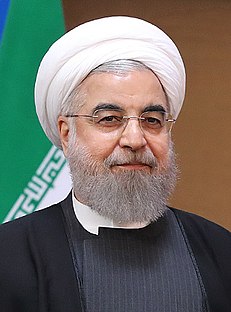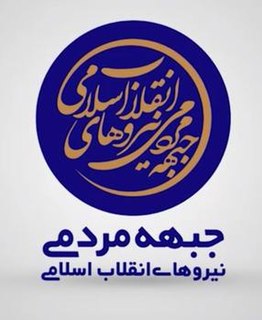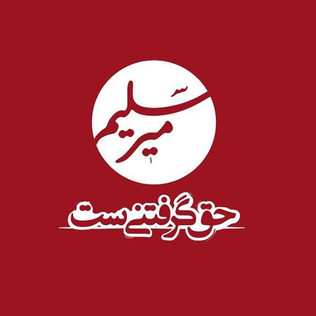| ||||||||||||||||||||
| Opinion polls | ||||||||||||||||||||
| Turnout | ||||||||||||||||||||
|---|---|---|---|---|---|---|---|---|---|---|---|---|---|---|---|---|---|---|---|---|
| ||||||||||||||||||||
 | ||||||||||||||||||||
 | ||||||||||||||||||||
| ||||||||||||||||||||
Presidential elections were held in Iran on 19 May 2017, the twelfth such election in Iran. Local elections were held simultaneously.

Iran, also called Persia, and officially the Islamic Republic of Iran, is a country in Western Asia. With over 81 million inhabitants, Iran is the world's 18th most populous country. Comprising a land area of 1,648,195 km2 (636,372 sq mi), it is the second largest country in the Middle East and the 17th largest in the world. Iran is bordered to the northwest by Armenia and the Republic of Azerbaijan, to the north by the Caspian Sea, to the northeast by Turkmenistan, to the east by Afghanistan and Pakistan, to the south by the Persian Gulf and the Gulf of Oman, and to the west by Turkey and Iraq. The country's central location in Eurasia and Western Asia, and its proximity to the Strait of Hormuz, give it geostrategic importance. Tehran is the country's capital and largest city, as well as its leading economic and cultural center.
Contents
- Electoral system
- Eligibility
- Timeline
- Candidates
- Registration and vetting process
- Approved candidates
- Campaign
- Debates and TV programs
- Campaigning platforms and techniques
- Role of social media
- Tactical nomination of Jahangiri
- Hashemitaba's endorsement of Rouhani
- Conservative consensus candidate
- Endorsements and positions
- Polling process
- Polling stations abroad
- Results
- Provincial votes
- International votes
- Maps and graphs
- Protests
- Allegations of foreign interference
- Judiciary head remarks
- President of Tatarstan visit
- Opinion polls
- Voter demographics
- Reactions
- Domestic
- International
- References
- External links
Candidates' registration took place from 11 to 15 April 2017. Incumbent president Hassan Rouhani was eligible to run for re-election. His rivals were the conservatives' top candidate Ebrahim Raisi, the Islamic Coalition Party's Mostafa Mir-Salim and Mostafa Hashemitaba who ran with no partisan support. [2]

Hassan Rouhani is an Iranian politician serving as the current and seventh President of Iran since 3 August 2013. He was also a lawyer, academic, former diplomat and Islamic cleric. He has been a member of Iran's Assembly of Experts since 1999, member of the Expediency Council since 1991, and a member of the Supreme National Security Council since 1989. Rouhani was deputy speaker of the fourth and fifth terms of the Parliament of Iran (Majlis) and Secretary of the Supreme National Security Council from 1989 to 2005. In the latter capacity, he was the country's top negotiator with the EU three, UK, France, and Germany, on nuclear technology in Iran, and has also served as a Shi'ite ijtihadi cleric, and economic trade negotiator. He has expressed official support for upholding the rights of ethnic and religious minorities. In 2013, he appointed former industries minister Eshaq Jahangiri as his first vice-president.
The Principlists also interchangeably known as the Iranian Conservatives and formerly referred to as the Right or Right-wing, are one of two main political camps inside post-revolutionary Iran, the other being Reformists. The term ‘hardliners’ that some western sources use in the Iranian political context, usually refers to the faction, despite the fact it includes also more centrist tendencies.

Sayyid Ebrahim Raisol-Sadati, commonly known as Ebrahim Raisi, is an Iranian politician, Muslim cleric and the current Chief Justice of Iran, being appointed on 7 March 2019. He served in several positions in Iran's Judicial system, such as Attorney General from 2014 to 2016, and Deputy Chief Justice from 2004 to 2014. He was also Prosecutor and Deputy Prosecutor of Tehran in the 1980s and 1990s. He was custodian and chairman of Astan Quds Razavi, a wealthy and powerful foundation or bonyad from 2016 until 2019. He is also a member of Assembly of Experts from South Khorasan Province, being elected for the first time in 2006 election. He is the son-in-law of Mashhad Friday prayer leader and Grand Imam of Imam Reza shrine, Ahmad Alamolhoda.
Rouhani was re-elected for a second term. According to results announced by the Interior Ministry, Rouhani received 23.5 of 41 million votes counted. His closest rival, Ebrahim Raisi, received 15.7 million votes. [3] Rouhani inaugurated on 5 August 2017 with taking oath of office for the second time at the Parliament of Iran.

The Ministry of Interior of the Islamic Republic of Iran is in charge of performing, supervising and reporting elections, policing, and other responsibilities related to an interior ministry.

The inauguration of Hassan Rouhani as the 7th President of Iran for his second term took place in two rounds, first on Thursday 3 August 2017, when he received his presidential precept from Supreme Leader Ali Khamenei, and second on Saturday 5 August, when he was sworn into office in the Parliament of Iran. This marked the commencement of the second four-year term of Hassan Rouhani as president and his vice president. The oath of office was administered by Chief Justice Sadeq Larijani.

An oath of office is an oath or affirmation a person takes before undertaking the duties of an office, usually a position in government or within a religious body, although such oaths are sometimes required of officers of other organizations. Such oaths are often required by the laws of the state, religious body, or other organization before the person may actually exercise the powers of the office or any religious body. It may be administered at an inauguration, coronation, enthronement, or other ceremony connected with the taking up of office itself, or it may be administered privately. In some cases it may be administered privately and then repeated during a public ceremony.







































